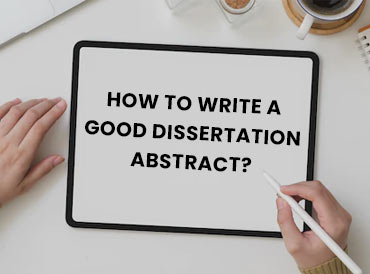An important component of dissertation writing is the dissertation abstract. The entire work is summarized in it. It gives readers a chance to learn about your dissertation’s main ideas, the research chapter, the methodology, and the results section. It’s crucial to write a dissertation abstract properly. To create a flawless dissertation abstract, students follow a variety of approaches and rules. The importance of proper thesis and dissertation structuring cannot be overstated. It must address every issue raised by the investigation and be formatted to point out a key section of a dissertation or thesis.
The key issues raised by the entire study are addressed in the dissertation abstract. This concise summary is one text page long. It should display the primary techniques employed, the issues that were examined, and the conclusions drawn from a challenging piece of research. This level of academic work calls for in-depth study. People who read abstracts prefer summaries that are concise yet extremely useful, with presented implications and transparent study results. Students often find difficulty in dissertation abstract writing, and so they turn to professional dissertation writing service online. Experienced professionals help students in writing a dissertation abstract that is on-point and well-formatted.
WHAT IS A DISSERTATION ABSTRACT?
The introduction of a dissertation, journal article, or report is an abstract. It serves as a summary of your work or research and provides a synopsis of each component of your dissertation. A dissertation abstract, in general, is a concise overview of a dissertation that includes all of the research and conclusions from the dissertation. The abstract is frequently the first section of a dissertation that the majority of readers will encounter, despite the fact that it is usually the last section to be completed. It can be viewed as a reduction of a full dissertation’s ideas, research, and work to their most fundamental elements. Even though a dissertation abstract is typically only one or two pages long, it serves to describe all the concepts that the whole dissertation may need hundreds of pages to cover.
In just one or two pages, the dissertation’s concepts and findings are presented in detail in the abstract. Given that the entire body of research is required for the abstract, this can be a pretty challenging effort that is often completed around the end of the dissertation’s development. Similar to a synopsis of a piece of art, it should include all the concepts discussed in the dissertation. A dissertation abstract should enable a reader to rapidly understand the information offered in the dissertation and then choose whether additional learning necessitates reading the entire dissertation.
What Does the Abstract Aim to Achieve?

Two key goals of a dissertation abstract are:
- The initial goal is to brief potential readers on the key thesis of your research so they won’t have to read the complete essay. It must express specifically what your research is about (what you’re attempting to learn) and what you found. The abstract is the first section that readers will take into consideration when deciding whether to read your dissertation or thesis.
- The abstract’s second objective is to provide information to dissertation databases and search engines so they can properly index your dissertation or thesis. By utilizing the words and phrases in your abstract, these search engines commonly categorize your work and make it user-accessible.
What to Include in A Dissertation Abstract?
A strong dissertation abstract typically includes the following information in terms of content:
- The goal of the study (what it is about and why it is significant)
- The technique (how you carried out the research)
- The main research conclusions (what answers you found)
- The results of this study’s implications (what these answers mean)
The major examined objectives, compound research questions, problem descriptions, thorough methodology, and findings are all included in the dissertation abstract. Source citations and acronyms have to be included in the abstract too. It enables conveying the main idea of a dissertation paper while supplying a thorough comprehension of the research topics and identifying various outcomes. It is required that you include key theories and hypotheses. They bring the required thesis abstract in the correct format and enable time savings for this crucial component’s flawless completion.
How to Write A Good Dissertation Abstract?

The objective, methodology, findings, and consequences of your study should all be covered in a good dissertation abstract. Your dissertation or thesis abstract’s format must therefore include these four components in the same sequence.
Let’s examine each of them individually, step by step:
1- Describe your research’s objectives and significance
Here, you must succinctly describe the aim and significance of your study. You must explain the relevance of your research’s goals and the objectives themselves, in simpler words. As you describe the goal of the research, you must be specific about the following points:
- What were your research’s goals and questions?
- Why were these objectives and concerns crucial?
This section must be exceedingly succinct, clear, and persuasive. This serves as the introduction and is where you “hook” your reader to pique their interest in your project. If you don’t make an effort in this area, you’ll probably lose their attention.
2- Give a brief description of the methods for your study
You need to give a very brief explanation of how you approached addressing your research questions in this section of your abstract. What research methodology and design do you use in your study in other words. To be addressed are the following important issues:
- Which method did you use, qualitative or quantitative?
- Who or what made up your sample?
- How were your data gathered?
- How were your data analyzed?
Simply said, the “how” of your study must be covered in this part. It doesn’t have to be long—this is simply a summary—but it must explicitly respond to the four points raised above.
3- Present your main results
The significant findings should then be briefly highlighted. There may be a desire to ramble here, given the abundance of information and insights that your research undoubtedly yielded. However, this section just discusses the main conclusions or the responses to the first queries that you set out to explore. Again, succinctness and clarity are key. The most crucial facts must be succinctly presented to the reader.
4- Describe the effects of your research

Have you ever looked through a lengthy report and found it difficult to comprehend the general implications of the findings? The implications section’s purpose is to underline the “now what?” of your observations.
- This section of your abstract should provide answers to the following queries:
- What effect do your research results have on the field or industry you studied?
- What effect do your results have on the body of existing knowledge?
- What might your findings imply for work being done on the subject in the future?
You’ll be on the right track if your dissertation abstract has these four crucial components.
Other Tips to Consider in Order to Write A Good Dissertation Abstract:
Ensure Simplicity
Use vocabulary relevant to your field of study, but avoid stuffing your abstract with jargon and huge phrases that obscure your meaning and make it hard to understand. An effective abstract should be simple to read and appealing to all levels of potential readers. Keep in mind that you should write for the informed layperson.
Thoroughness
The dissertation as a whole, not just a portion of it, must be represented in the abstract. Abstracts should include a summary of the objectives, evaluated literature, methodology, analysis, and findings. Don’t leave too many surprises in your abstracts because they are meant to educate the reader about what they are about to read.
Be Precise
There is no need to withhold material while writing your dissertation abstract; instead, make sure to concisely summarize your most significant conclusions and ideas. The reader should be able to easily comprehend the main conclusions of your dissertation after reading the abstract, which is the one manner in which your abstract differs from other researches.
Balance
The abstract should reflect this balance just as the dissertation as a whole must continue to keep the appropriate amount of room between various chapters.
Clarity of Speech
Writing concisely is necessary for abstracts if you want to keep the word count down. Be careful to avoid obscurity and lack of clarity while summarizing such a large amount of information. Make sure an intelligent layperson might understand some of the abstract.
Final Thoughts
A key element of your dissertation is the abstract. It is most likely the first substantial statement of your work that an outside examiner will read because it is presented at the beginning of the thesis. It’s a chance to create realistic expectations, so take advantage of it. The entire argument is summarized in the abstract. It gives a remarkably simplified version of all the key ideas in your work. An introduction in the sense of a prelude, preamble, or advance organizer that gets the reader ready for the thesis is not what an abstract is. In addition to serving that purpose, it must be able to stand in for the dissertation when there isn’t enough time or room for the entire text.
Writing a good dissertation abstract demands clarity in the text, conciseness and correct use of vocabulary. Your dissertation abstract must be entirely original and distinctive. Your project’s importance to the scientific community should be clear to your readers. Your work should have a goal, highlighting some hitherto unrecognized (or incompletely explored) enquiry and offering fresh solutions to them that have scientific or practical importance. This should make it easier for you to show how valuable your contributions to science are. To get the greatest possible rating on your abstract, provide all of this important information. As many students find it difficult to write a good abstract, it is wise to take professional dissertation writing services online from the best experts.

